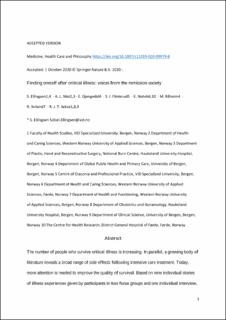“Finding oneself after critical illness”: voices from the remission society
Ellingsen, Sidsel; Moi, Asgjerd Litleré; Gjengedal, Eva; Flinterud, Stine Irene; Natvik, Eli; Råheim, Målfrid; Sviland, Randi; Sekse, Ragnhild Johanne Tveit
Peer reviewed, Journal article
Accepted version
Permanent lenke
https://hdl.handle.net/11250/2725374Utgivelsesdato
2020Metadata
Vis full innførselSamlinger
- Import fra CRIStin [3604]
- Institutt for helse- og omsorgsvitskap [2776]
Originalversjon
Ellingsen, S., Moi, A. L., Gjengedal, E., Flinterud, S. I., Natvik, E., Råheim, M., . . . Sekse, R. J. T. (2020). “Finding oneself after critical illness”: voices from the remission society. Medicine, Health Care and Philosophy. 10.1007/s11019-020-09979-8Sammendrag
The number of people who survive critical illness is increasing. In parallel, a growing body of literature reveals a broad range of side-effects following intensive care treatment. Today, more attention is needed to improve the quality of survival. Based on nine individual stories of illness experiences given by participants in two focus groups and one individual interview, this paper elaborates how former critically ill patients craft and recraft their personal stories throughout their illness trajectory. The analysis was conducted from a phenomenological perspective and led to the meaning structure; a quest to find oneself after critical illness. In this structure, illness represented a breakdown of the participants’ lives, forcing them to develop a new understanding of themselves. Despite acute illness, they felt safe in hospital. Coming home, however, meant a constant balancing between health and illness, and being either in or out of control. To gain a deeper understanding of the participants’ narratives of survival, the meaning structure was developed from a phenomenological life world perspective, Heidegger’s concept of homelikeness and Arthur Frank’s typologies of illness narratives. In conclusion listening to and acknowledging the patients’ lived experiences of critical illness may support the patient efforts to establish the newly defined self and hence be vital for recovery. Phenomenology is one approach facilitating care tailored to the patients’ lived experience of critical illness and its aftermaths.
Beskrivelse
This is a post-peer-review, pre-copyedit version of an article published in Medicine, Health Care and Philosophy. The final authenticated version is available online at: https://doi.org/10.1007/s11019-020-09979-8
